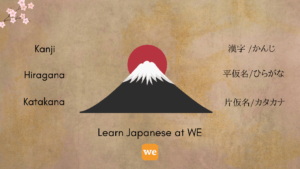Author: Natsuko Seki
When reading on a smartphone, we recommend turning the screen to landscape mode.
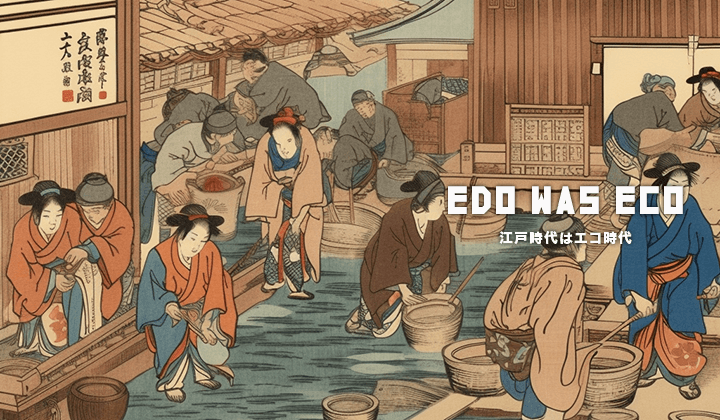
Warming up Audio
Keywords and Summary
| Japanese Word | Furigana | English Word | Example Sentence (Japanese & English) |
|---|---|---|---|
| 公共 | こうきょう | Utilities | ウクライナ戦争による原油高により、公共料金が高騰しています。 High oil prices and import/export restrictions from the Ukraine war are causing utility prices to skyrocket. |
| 物価 | ぶっか | Price | 公共料金の上昇に伴い、物価も上昇しています。 As public utilities fees increase, prices are also rising. |
| 平均給与 | へいきんきゅうよ | Average salary | 日本では30年間、平均給与は変わらず、多くの企業がボーナスや従業員を削減し、多くの人々にとって厳しい状況が続いています。 In Japan, average salary has been stagnant for 30 years and companies reduced bonuses and staff, making life difficult for many. |
| 意識 | いしき | Conscious | このような状況で、生活費に対する意識が高まっています。 The situation in Japan has led to increased awareness of living costs among the public. |
| 節約 | せつやく | Saving, Economy | 日本では、省エネ家電を使ったり、早寝早起きの習慣を身につけることで、光熱費を節約している人が多いです。 People in Japan are saving on utility costs by using energy-efficient appliances and early bedtimes habits. |
| 築いた | きずいた | To built | 自然資源を活用してリサイクル志向の社会を築いた江戸が注目されています。 Natural resources helped Edo build a recycling-focused society, which is now attracting attention. |
| 世界最大 | せかいさいだい | The largest in the world | 江戸は18世紀には世界最大の都市の1つであり、水道や下水道のシステムがすでに整備されていました。 Edo was one of the largest cities in the world,- established water and sewage systems in the 18th century. |
| 技術的 | ぎじゅつてき | Technologically | 当時のエコシステムは技術的にも進んでおり、現代においても関連性があります。 The ecosystem of that time was technologically advanced and relevant even today. |
| 価値観 | かちかん | Sense of values | 日本人には単なる倹約を超えた、物や自然に対する価値観があります。 Japanese people have values towards things and nature beyond frugality. |
| 高度成長 | こうどせいちょう | High growth | 高度成長を迎えた日本は、半世紀前に省エネや資源節約型の技術革新を推進し、世界を驚かせました。
Half a century ago, Japan achieved high growth through energy and resource-saving innovations. |
| 混沌 | こんとん | Chaos | 日本は常に混沌からチャンスを生み出してきました。 Japan thrives on turning chaos into opportunity. |
| 表裏一体 | ひょうりいったい | Two sides of the same coin | ピンチとチャンスは常に表裏一体です。 Crisis and opportunity are always two sides of the same coin. |
Let's build up your reading skills
The rise in prices of electricity, gas, and other utilities due to high oil prices and import/export restrictions caused by the war in Ukraine, and the resulting increase in prices, are making headlines on a daily basis.
ウクライナ戦争による原油高や輸出入規制などの影響により、電気、ガスなどの公共料金の上昇、それに伴う物価の上昇が、日々のニュースを賑わせています。
For the past 30 years, the average salary income of Japanese citizens has remained the same, and many companies have implemented bonus and workforce reductions. The situation continues to be difficult for the people.
この30年、日本国民の平均給与所得は変わらず、ボーナスや人員削減を実行する企業も少なくありません。国民にとって苦しい状況が続いています。
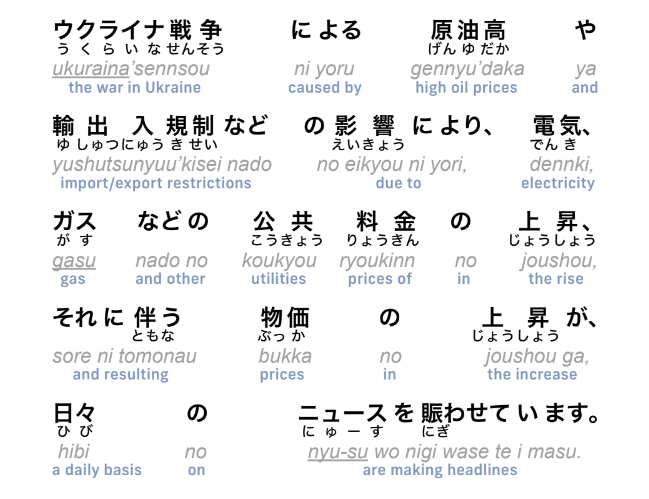
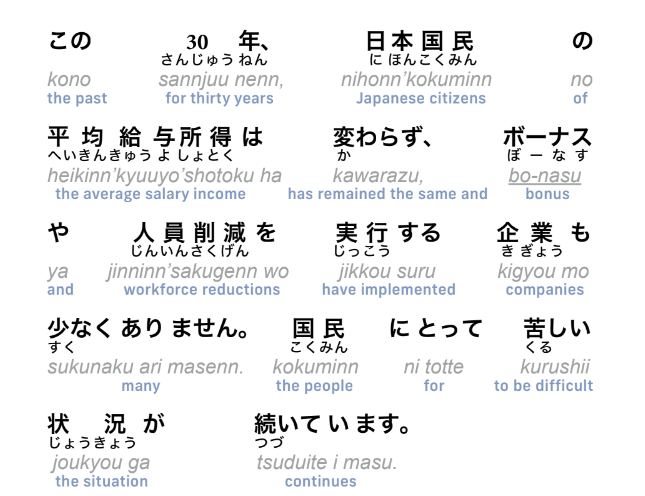
What has been noticeable in this situation is that the public has become more conscious of the cost of living.
こうした状況で顕著になったのが、生活コストに対して国民の意識が高まっていることです。
For example, they switch to energy-efficient appliances to reduce utility costs and make it a habit to go to bed early and get up early to save on heating and cooling.
例えば、光熱費を抑えるため、省エネ機器に切り替えたり、早寝早起きを習慣化して冷暖房を節約したりしています。

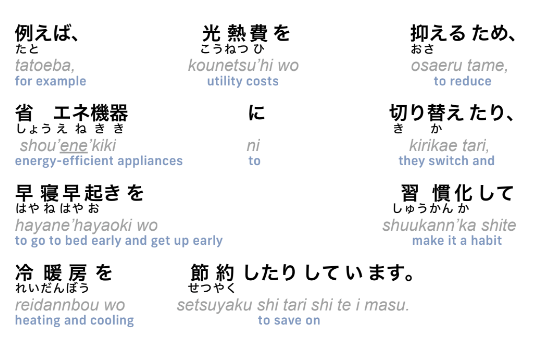
Against this backdrop, Edo (now Tokyo), a city that utilized natural resources to build a recycling-oriented society, has been attracting attention.
そんな中、天然資源を活用して循環型社会を築いた江戸(現在の東京)が注目されています。
In the 18th century, Edo was one of the largest cities in the world with a population of one million and water and sewage systems were already in place.
18世紀、江戸は人口100万人を有する世界最大の都市の一つで、すでに上下水道が整備されていました。


The ecosystem of that time was technologically superior, and there are many things we can learn from it even today.
当時のエコシステムは技術的にもすぐれており、現在でも学ぶ点はたくさんあります。
At the heart of the Japanese people is a sense of value for things and nature that goes beyond mere frugality.
日本人の根底には、単なる節約志向にとどまらない、モノや自然に対する価値観があります。

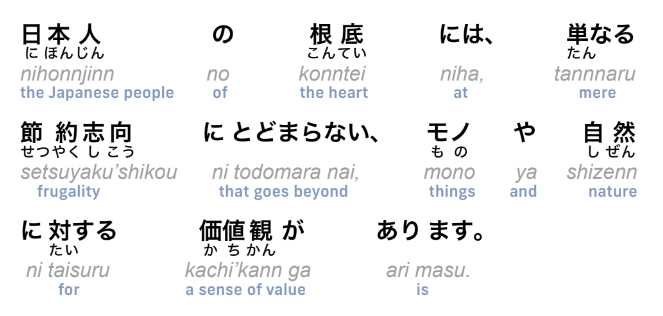
The Edo period was supported by the MOTTAINAI spirit.
江戸を支えたのはもったいない精神でした。
Half a century ago, when we were plagued by pollution, we achieved high growth that surprised the world by promoting energy-saving, resource-saving, and low-cost type technological innovations.
公害に悩んだ半世紀前には、省エネ、省資源、低コスト型の技術革新を進め、世界が驚く高度成長を成し遂げ ました。


Japan has always created new and improved ideas out of chaos.
日本はいつの時代も、混沌から新たな工夫や改善のアイディアを生み出してきました。
Crisis and opportunity are two sides of the same coin.
ピンチとチャンスは表裏一体です。
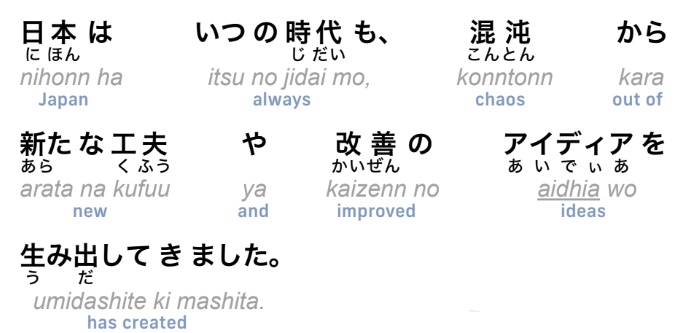

Mini Lesson: MOTTAINAI spirit
Have you ever heard of the word "もったいない" (mottainai)?
もったいない is a Japanese word that reflects the traditional Japanese spirit of valuing things and expresses regret or disappointment over wasted or unused resources, whether it be food, materials, or opportunities.
It can be translated as "what a waste" or "don't waste" in English.
Now, let's see how it is used in daily life.
| Japanese | English |
|---|---|
| 食べ物を捨てるのはもったいない。 | It's a waste to throw away food. |
| この服はまだ着られるのに捨てるのはもったいない。 | This clothing can still be worn, so it's a waste to throw it away. |
| また電気をつけっぱなしにして!もったいない。 | Don't leave the lights on again! It's such a waste. |
In recent years, the term has gained global attention as a concept related to environmental sustainability and the reduction of waste.


